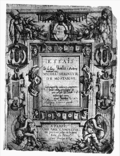Essay
An essay is a written text. It is usually about the personal point of view of the author who wrote it. The definition of an essay is vague. Articles and short stories can be quite similar. Almost all modern essays are written in prose, but works in verse have been called essays (e.g. Alexander Pope's An Essay on Criticism and An Essay on Man). People that write essays are called essayists.
Most essays are short. This does not have to be the case. John Locke's An Essay Concerning Human Understanding and Thomas Malthus's An Essay on the Principle of Population are long essays.
Essays can have all sorts of purposes. For example, an essay can be very argumentative, it can talk about points for and against the essay question to give a balanced argument or opinion. Essay must be essential and give some new points about topics. Its must be useful to readers.
Michel de Montaigne, a 16th century philosopher invented the essay.
Types
- argument led approach. An argumentative essay is a critical piece of writing, aimed at presenting objective view of a subject matter. It is narrowed down to a single topic. [1]
- thesis led approach. A thesis statement based essay follows a thesis which supports a particular case.[2][3][4][5]
- cause and effect,
- problem and solution,
- comparison and contrast,
- description,
- classification,
- analysis,
- argument and evidence,
- procedural sequence,
- chronological ordering.
Argumentative Essay
The argumentative essay is a genre of writing that requires the student to investigate a topic; collect, generate, and evaluate evidence; and establish a position on the topic in a concise manner. The structure of the argumentative essay is held together by coherence, logical arguments, evidential support, and a conclusion. Some examples of argument essay topics are 'Is polygamy evil or not?', 'Are US elections always fair?'
Thesis Essay
This is a genre of essay where a stance is presented in an essay using a thesis statement. A thesis statement is one or more sentence that expresses the main idea of a research paper or essay, such as an expository essay or argumentative essay. It makes a claim, directly answering a question. The thesis statement serves as a guide for the readers throughout the whole entire essay.
Essay Media
Essays of Michel de Montaigne
University students, like these students doing research at a university library, are often assigned essays as a way to get them to analyze what they have read.
"After School Play Interrupted by the Catch and Release of a Stingray" is a simple time-sequence photo essay.
References
- ↑ Chapter 6: Comparison and Contrast in Glenn, Cheryl. Making Sense: A Real-World Rhetorical Reader. Ed. Denise B. Wydra, et al. Second ed. Boston, MA: Bedford/St. Martin's, 2005.
- ↑ Jane Gallop (12 November 2012). Polemic: Critical Or Uncritical. Routledge. pp. 15+. ISBN 978-1-135-87348-6.
- ↑ "English Composition 1: Thesis". papyr.com.
- ↑ https://www.ee.princeton.edu/people/alumni/thesis-led-essay.html[dead link]
- ↑ Chapter 2: Description in Glenn, Cheryl. Making Sense: A Real-World Rhetorical Reader. Ed. Denise B. Wydra, et al. Second ed. Boston, MA: Bedford/St. Martin's, 2005.



